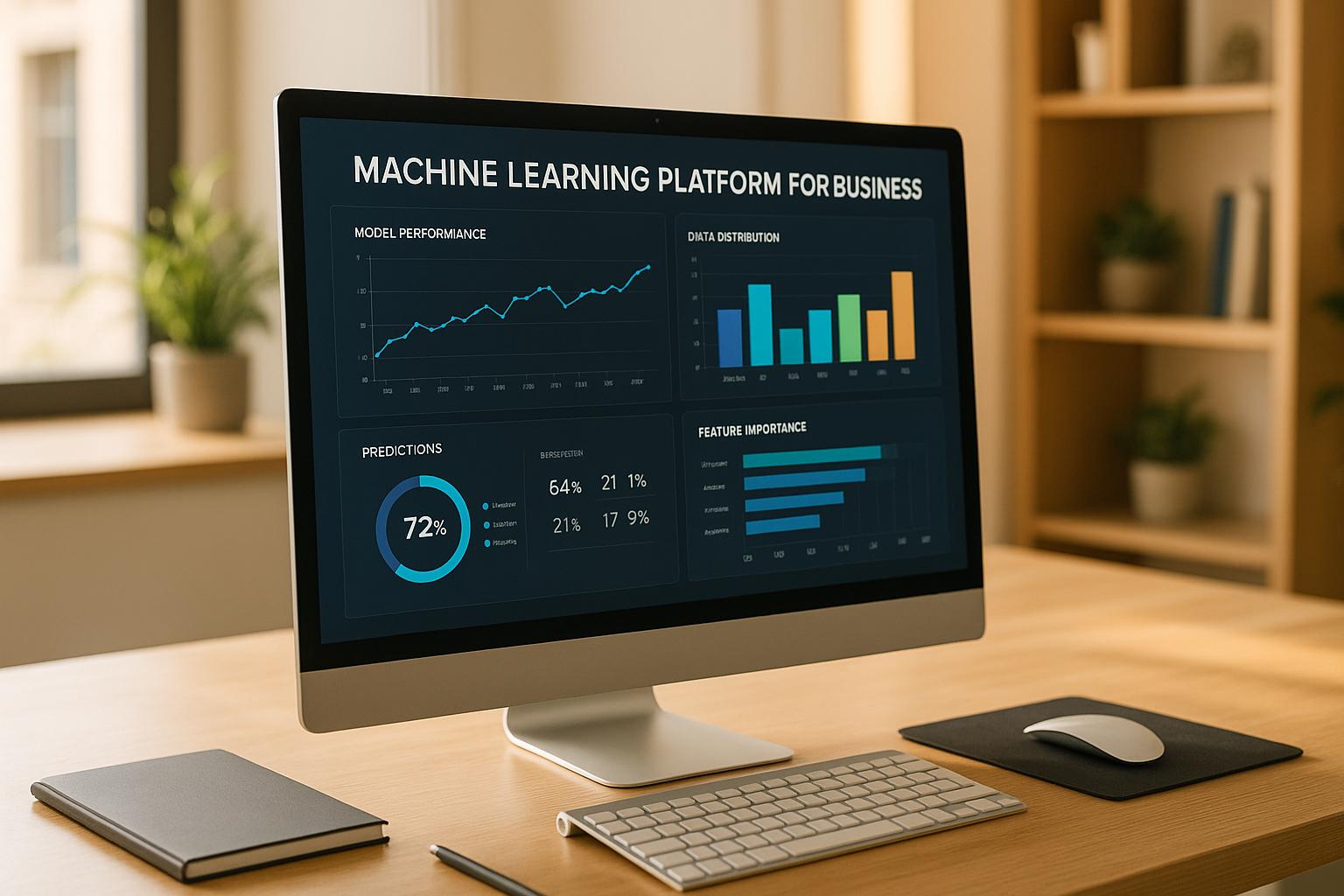
Machine learning platforms are reshaping how businesses operate, offering tools to process data, automate tasks, and improve decision-making. Whether you're a startup or a Fortune 500 company, choosing the right platform is key to saving costs, scaling operations, and maintaining security.
Here’s a quick look at the top contenders:
Choosing the right platform depends on your business needs - whether it’s cost control, AI integration, or scaling capabilities. Below, we dive deeper into each platform’s features and benefits.

Prompts.ai is an enterprise AI orchestration platform designed to simplify and unify access to over 35 leading large language models, including GPT-4, Claude, LLaMA, and Gemini. By providing a single, secure interface, it eliminates the hassle of juggling multiple AI tools. This streamlined solution is tailored for Fortune 500 companies, creative agencies, and research labs, offering the governance and cost efficiency essential for large-scale AI operations.
At its core, Prompts.ai thrives on integrating a wide range of AI models into one cohesive system. This eliminates the chaos of managing disparate tools and ensures teams can focus on their goals. Through a centralized dashboard, users can efficiently compare model performance side by side, simplifying decision-making and improving workflow management. This seamless integration underscores the platform's mission to simplify enterprise AI deployment.
Prompts.ai takes cost control to the next level with real-time FinOps tools that provide full visibility into spending. Using a pay-as-you-go TOKN credit system, companies can cut AI software expenses by up to 98%, avoiding the burden of recurring subscription fees. Costs are aligned directly with usage, ensuring businesses pay only for what they use.
The platform tracks every token consumed across models and teams, offering detailed insights into spending. This allows finance teams to tie costs to specific business outcomes, making it easy to identify areas for optimization. With this level of transparency, organizations can not only manage budgets effectively but also align spending with strategic goals.
Governance and security are at the heart of Prompts.ai. It provides comprehensive audit trails that document all AI interactions, ensuring accountability across teams and projects. The platform’s robust security features safeguard sensitive data, keeping it under the organization’s control. Additionally, the compliance framework is designed to meet industry standards and regulatory requirements, making it an ideal choice for businesses with stringent compliance needs.
Prompts.ai is built for rapid scalability, allowing users to add models, teams, and workflows in just minutes. Its automation features further enhance efficiency by streamlining repetitive tasks throughout the AI development process, from data preparation to model deployment.
The platform includes expertly designed workflows that incorporate best practices, enabling teams to adopt proven methodologies without starting from scratch. This not only boosts productivity but also ensures consistency across projects and departments, showcasing Prompts.ai as a comprehensive solution for managing enterprise AI initiatives.
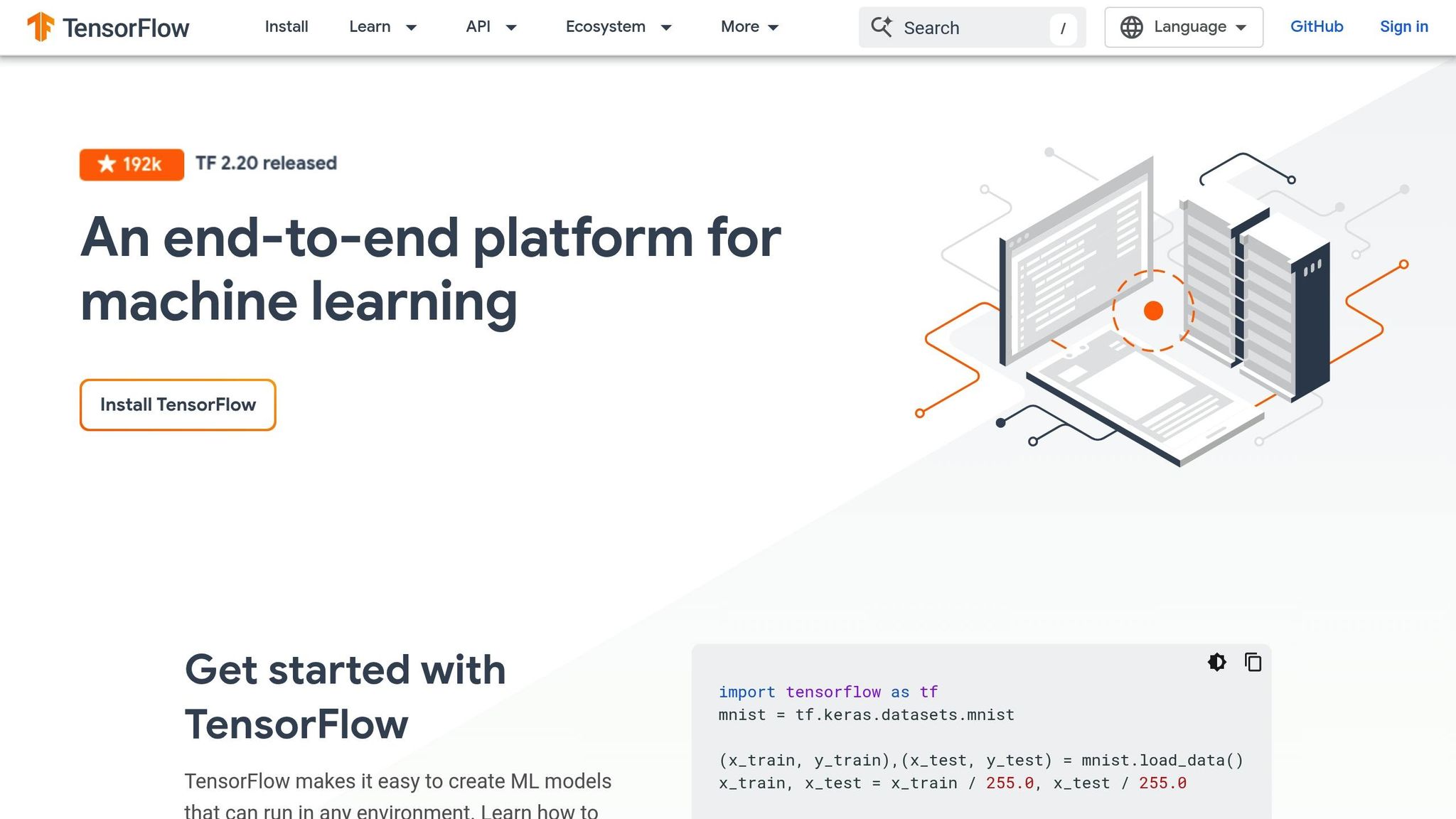
TensorFlow, developed by Google Brain, is an open-source machine learning framework designed to work seamlessly across various hardware setups, including CPUs, GPUs, and Google's specialized TPUs. It adapts to both single-device use and distributed computing environments, making it capable of handling large datasets and sophisticated models with ease. Its ability to scale and its flexible deployment options make it a powerful tool for businesses managing data-intensive projects. From organizing data workflows to deploying complex AI models, TensorFlow simplifies operations and serves as a cornerstone for advancing AI-driven business solutions.
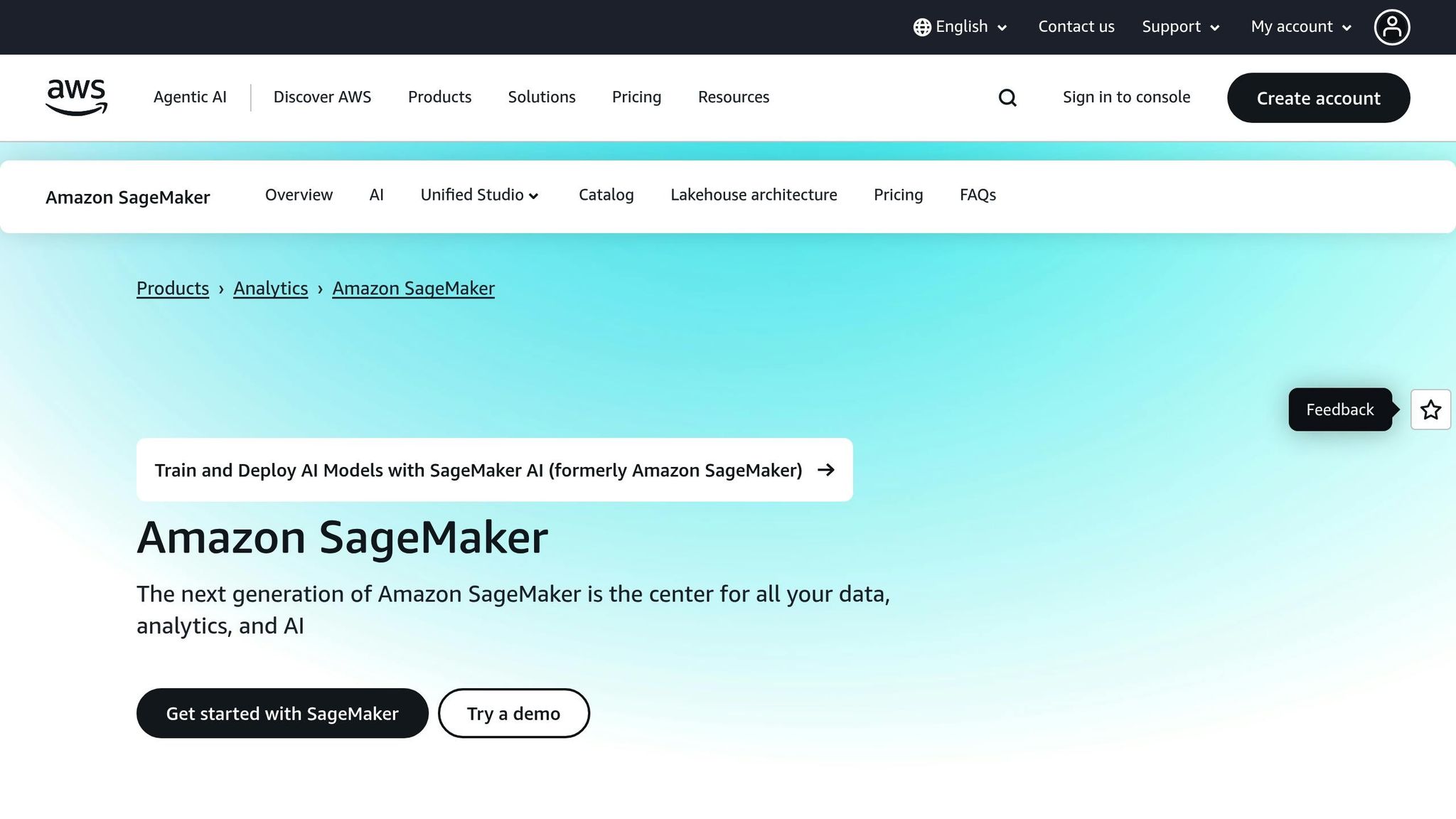
Amazon Web Services SageMaker is a managed machine learning platform designed to make building, training, and deploying ML models more accessible and efficient. It provides businesses with the tools and infrastructure necessary to implement machine learning solutions without requiring extensive expertise in cloud computing or model deployment.
SageMaker brings together all essential machine learning tasks - data preparation, model building, training, and deployment - into a single Studio IDE workspace. It supports widely-used tools like Jupyter notebooks and frameworks such as PyTorch, scikit-learn, and Hugging Face, making collaboration seamless. The platform's Feature Store centralizes feature engineering and sharing, improving efficiency. By integrating these processes and offering cost controls, SageMaker enhances operational workflows.
SageMaker operates on a pay-as-you-go model, charging only for the compute time used during training and inference. Its spot training feature leverages spare AWS compute capacity to cut training costs. Additionally, detailed cost tracking at the project and team levels helps businesses monitor spending across various initiatives.
The platform also provides cost-saving recommendations, identifying ways to lower expenses without compromising model performance. These features are paired with strong governance measures to ensure compliance and security.
SageMaker addresses enterprise security needs with audit trails that document model runs, data access, and deployment changes - essential for meeting regulatory requirements in industries like healthcare and finance. The model registry ensures version control and approval workflows, so only validated models are deployed to production environments. This governance framework includes automated quality checks and human approval steps to align with risk management policies.
Data encryption, both in transit and at rest, is managed through AWS Key Management Service to safeguard sensitive information. Role-based access controls further ensure that team members can only access the data and models relevant to their roles. These features are designed to meet enterprise security standards while supporting scalable operations.
SageMaker seamlessly scales from prototype to production without requiring manual infrastructure management. It adjusts resources dynamically to handle varying workloads, from a handful of requests per day to millions of predictions per hour.
The platform's multi-model endpoints allow businesses to host multiple machine learning models on the same infrastructure. This not only simplifies management but also reduces costs by intelligently loading and unloading models based on traffic needs.
Automation is another key feature. SageMaker enables businesses to set up end-to-end workflows that automatically retrain models when new data becomes available. These pipelines can be triggered by factors such as data quality metrics, changes in model performance, or scheduled updates, ensuring models stay accurate over time without manual effort. This combination of scalability and automation helps businesses streamline their machine learning operations effectively.
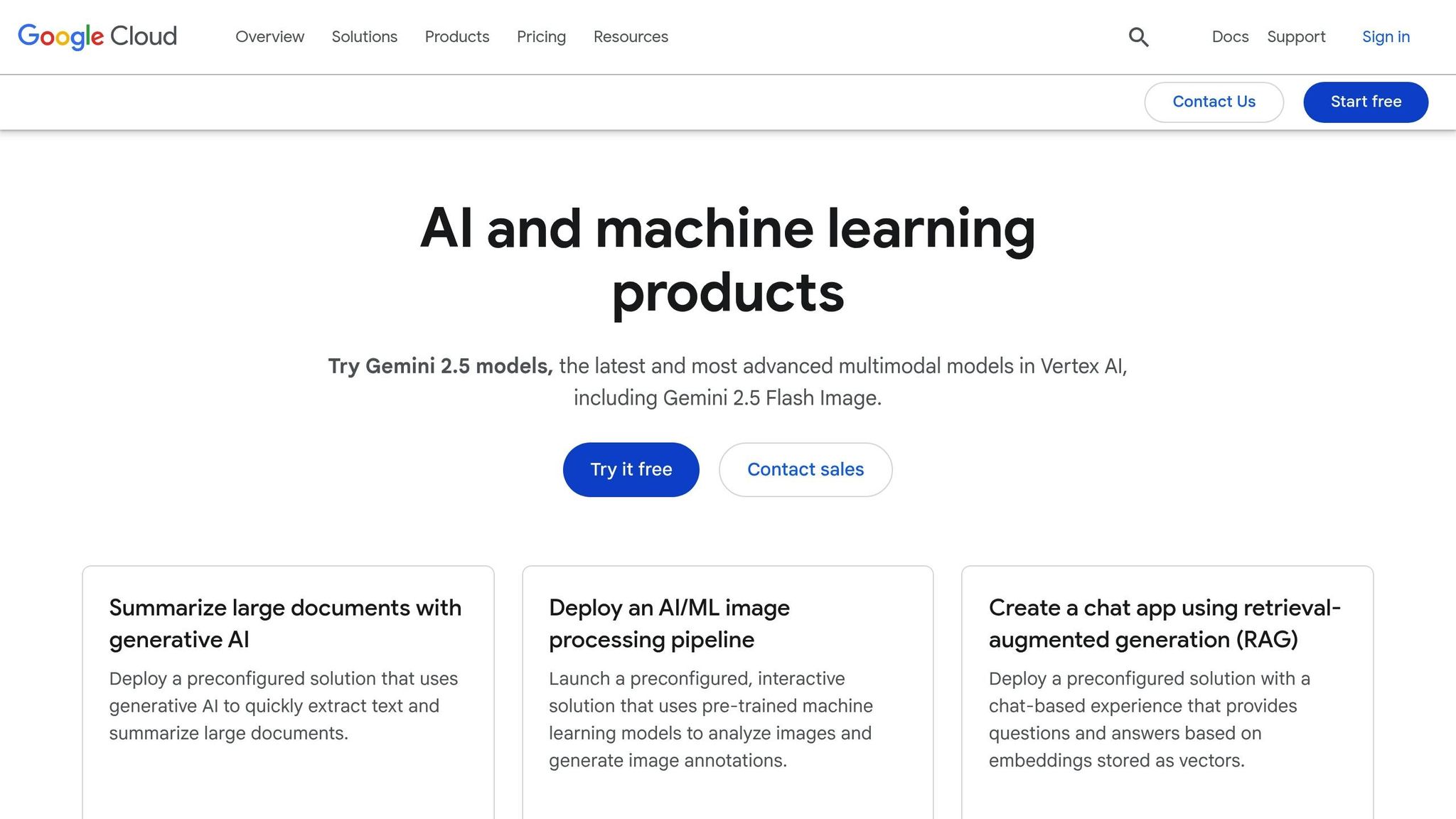
Google Cloud AI Platform delivers a robust machine learning environment that combines Google's advanced AI technologies with enterprise-level infrastructure. Designed to support every stage of the ML lifecycle - from data preparation to model deployment - it caters to organizations of all sizes and technical expertise.
The platform seamlessly integrates with the Google Cloud ecosystem, offering instant access to tools like BigQuery, Cloud Storage, and more. Vertex AI serves as the backbone, bringing together data engineering, data science, and machine learning workflows under one roof. It supports popular frameworks such as TensorFlow, PyTorch, and scikit-learn, making it versatile for different user needs.
For those looking to simplify the process, pre-built APIs and AutoML tools allow the creation of custom models with minimal coding. Additionally, AI Hub acts as a central repository for ML components and datasets, streamlining collaboration across teams. To top it off, the platform's pricing structure ensures operations remain cost-efficient.
With a pay-as-you-go pricing model, Google Cloud AI Platform offers flexible spending options. Preemptible instances can slash training costs by up to 80%, while tools like cost estimation, committed use discounts, and budget alerts help businesses manage expenses effectively.
The platform addresses critical enterprise security needs with features like audit logging, which tracks every action - from training to deployment and inference. These logs integrate with Google Cloud's Security Command Center, offering centralized monitoring and threat detection.
Key governance tools include:
These features, combined with scalability and automation, make the platform a powerful tool for enterprises.
Google Cloud AI Platform dynamically scales infrastructure to match workload demands, whether you're running small prototypes or managing production systems with millions of daily predictions. Its global infrastructure and ML Pipelines automate tasks from data ingestion to deployment, ensuring efficiency and accuracy.
Highlights include:
The platform also supports continuous integration and deployment (CI/CD) by integrating with tools like GitHub and GitLab. This automation accelerates the journey from model development to deployment while maintaining high-quality standards. Whether scaling operations or automating workflows, Google Cloud AI Platform ensures businesses can meet their AI goals with precision and ease.
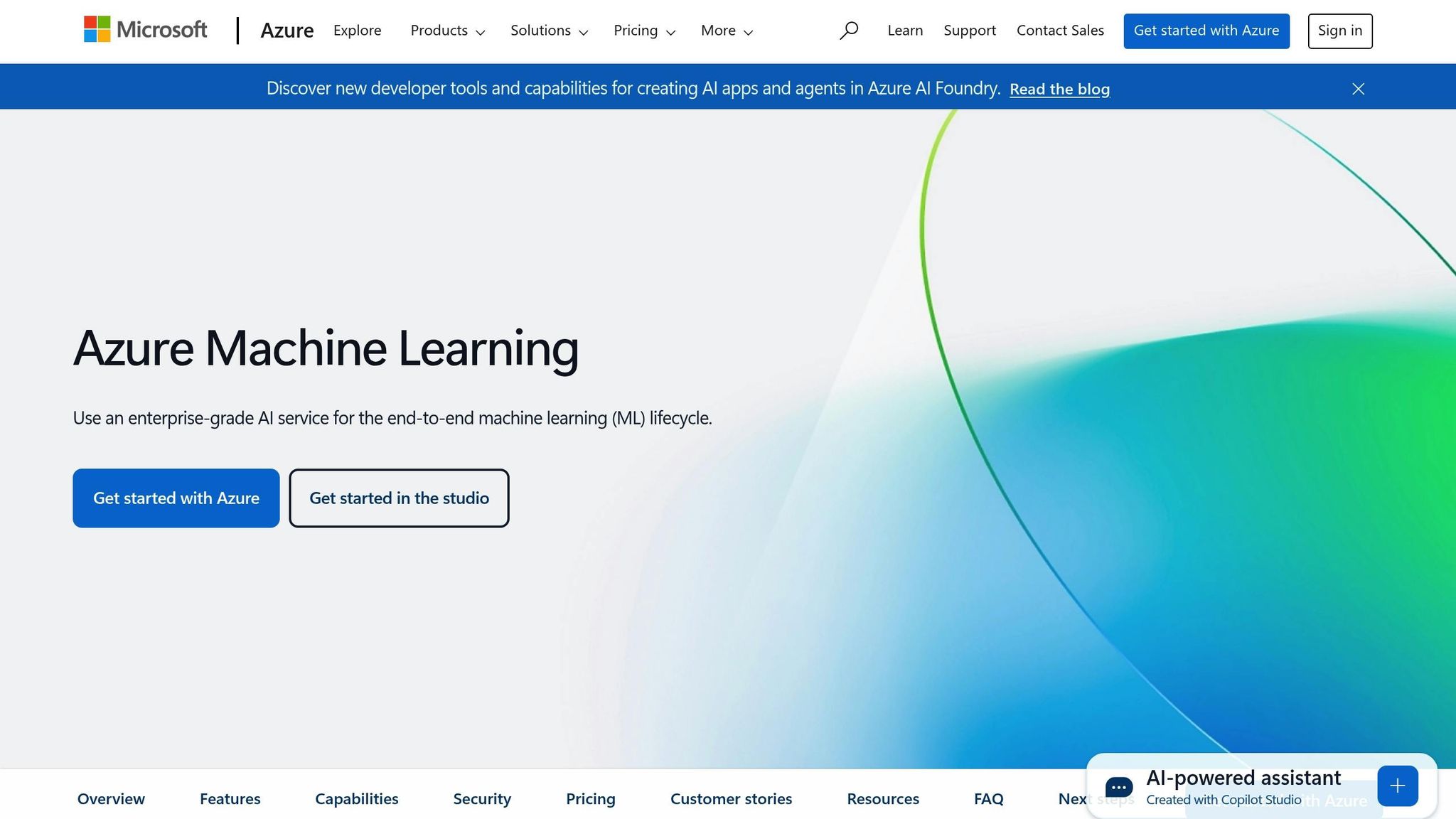
Microsoft Azure Machine Learning empowers businesses to develop, deploy, and manage machine learning (ML) models at scale, leveraging Microsoft's extensive cloud infrastructure.
Azure Machine Learning seamlessly connects with Microsoft's ecosystem, including Power BI, Office 365, and Dynamics 365, making it easier for teams to integrate ML capabilities into their existing workflows. Its drag-and-drop Studio simplifies building ML workflows, requiring minimal coding, which makes it accessible for users with varying technical expertise.
The platform supports multiple programming languages and frameworks, enabling flexibility for developers. With automated pipelines, tasks like data preparation, model training, and deployment are streamlined, speeding up the entire development process. The Automated ML feature further simplifies this by automatically testing different algorithms and hyperparameter settings, making advanced ML techniques more approachable for teams with limited data science experience.
Azure Machine Learning operates on a pay-as-you-go pricing model, ensuring businesses only pay for the resources they use. Through Azure Cost Management, teams can gain detailed insights into compute, storage, and data transfer expenses, helping them make informed financial decisions.
To optimize spending, the platform offers options like low-priority, reserved, and spot instances, which adjust costs based on demand. Additionally, automatic scaling allocates resources efficiently, while built-in cost estimation tools allow teams to predict expenses before starting their projects.
Security and compliance are core to Azure Machine Learning. It uses Role-Based Access Control (RBAC) and Azure Active Directory for centralized security management. All actions are logged through audit trails integrated with Azure Security Center, and data is encrypted both in transit and at rest.
The platform also includes features like model interpretability, private endpoints, and virtual network integration, ensuring compliance with regulatory requirements across industries that demand strict data governance.
Azure Machine Learning is designed to scale effortlessly, whether you're working on small prototypes or deploying large-scale production models. It integrates with Azure Kubernetes Service (AKS) to support containerized deployments, allowing for flexible and efficient scaling.
Automation is a key strength of the platform. Pipelines can be triggered by data changes or schedules to handle tasks like data ingestion, preprocessing, training, and deployment. Features such as real-time inference, batch scoring, and A/B testing help optimize performance in production environments. Furthermore, integration with Azure DevOps ensures smooth CI/CD workflows, complete with version control and automated testing, enabling rapid deployment and ongoing model improvements.
Choosing the right platform for your business depends on understanding its features and how they align with your goals. Below is a detailed comparison of the key capabilities offered by leading platforms available to US businesses.
| Platform | Model Support | Workflow Automation | Cost Management | Governance & Compliance | Community/Training | Scalability |
|---|---|---|---|---|---|---|
| Prompts.ai | 35+ leading LLMs, including GPT-4, Claude, LLaMA, and Gemini, in one interface | Expert-designed prompt workflows with "Time Savers" templates | Pay-as-you-go TOKN credits with real-time FinOps tracking, reducing AI costs by up to 98% | Enterprise-grade audit trails, role-based access control, and strong data governance | Prompt Engineer Certification program and an active community of practitioners | Effortless model switching and unlimited team scaling without platform fees |
| TensorFlow | Open-source framework supporting custom models and TensorFlow Lite for mobile | TFX pipelines for complete ML workflows with automated model validation | Free open-source framework; cloud costs depend on the provider | Basic security features; compliance varies by deployment environment | Comprehensive documentation and a global developer community supported by Google | Distributed training and TensorFlow Serving for production deployment |
| AWS SageMaker | Built-in algorithms, custom models, and pre-trained foundation models | SageMaker Pipelines with automated MLOps and model monitoring | Pay-as-you-go pricing with savings potential through reserved instance options | SOC, PCI, and HIPAA compliance, with deep integration into AWS IAM | AWS training courses, certification programs, and extensive documentation | Auto-scaling compute, multi-AZ deployment, and seamless integration within the AWS ecosystem |
| Google Cloud AI Platform | Powered by Vertex AI with pre-trained models, AutoML, and custom training support | Vertex AI Pipelines with automated hyperparameter tuning and continuous training | Pay-per-use pricing with committed usage discounts and cost forecasting tools | Strong security with audit logging, VPC integration, and data residency controls | Google Cloud training, hands-on labs via Qwiklabs, and collaborations with AI research | Automatic scaling, distributed training, and a global infrastructure supporting edge deployments |
| Microsoft Azure ML | Automated ML, designer interface, and compatibility with popular frameworks | Azure ML Pipelines integrated with Azure DevOps for CI/CD | Charges only for compute resources, with integrated Azure Cost Management | Role-based access via Azure Active Directory, audit trails, and encryption for data in transit and at rest | Microsoft Learn modules, certification paths, and integration with the Office 365 ecosystem | Integration with Azure Kubernetes Service, automatic scaling, and hybrid cloud deployment |
When it comes to cost models, each platform offers unique pricing structures. AWS employs traditional cloud pricing with options for reserved instances, while Azure focuses on charging only for the compute resources you use. Google Cloud AI Platform provides committed usage discounts, which are ideal for businesses with predictable workloads. Prompts.ai simplifies cost management further by offering pay-as-you-go TOKN credits, coupled with real-time FinOps tracking to maximize savings.
From a governance perspective, all platforms ensure compliance with key US regulations like HIPAA and SOC 2. However, their approaches differ. Azure's integration with Active Directory is particularly advantageous for businesses already using Microsoft solutions, while AWS delivers granular security controls through its mature IAM system. Prompts.ai stands out by providing built-in governance tools, including enterprise-grade audit trails and role-based access controls, tailored for business users.
Scalability plays a crucial role in supporting long-term business growth. AWS and Google Cloud offer global infrastructures, while Azure provides robust hybrid cloud capabilities. TensorFlow, as an open-source framework, offers flexibility but demands more technical expertise to scale effectively. Prompts.ai distinguishes itself with seamless model switching and unlimited team scaling, making it an ideal choice for businesses looking to grow without being bogged down by platform fees.
While most platforms focus on technical documentation and developer communities, Prompts.ai addresses a common challenge for US businesses: the skills gap in AI implementation. Its Prompt Engineer Certification program equips non-technical teams with the expertise needed to leverage AI effectively, bridging the gap between advanced tools and practical business use.
Machine learning platforms are now central to driving innovation in modern businesses, helping organizations across the United States turn data into actionable insights while streamlining operations. Whether it’s a Fortune 500 company refining its supply chain or a creative agency tailoring customer experiences, these platforms are essential for staying competitive in today’s fast-paced market.
As highlighted in the platform comparisons above, successful AI adoption hinges on selecting systems that integrate operations and maintain clear cost controls. Consolidating tools into a unified platform reduces complexity and avoids the budget overruns often caused by juggling multiple disconnected AI solutions.
Unlike traditional cloud services with hidden fees, platforms offering transparent, pay-as-you-go models - such as those using TOKN credits - make AI expenses predictable. This level of clarity allows teams to innovate confidently, free from unexpected financial setbacks.
The smartest strategy involves centralizing AI operations on platforms that unify various models, offering clear insights into both spending and performance. Features like role-based access controls, detailed audit trails, and built-in compliance measures not only safeguard organizations but also create an environment where innovation can thrive.
Ultimately, the right platform aligns with an organization’s goals, technical needs, and growth plans. No matter the size of the business, success comes from choosing tools that simplify the AI journey, eliminate unnecessary complexity, and enable teams to focus on creativity and problem-solving instead of managing infrastructure. The platforms that succeed today are those that reduce fragmentation, ensure cost transparency, and empower businesses to innovate effectively.
Prompts.ai empowers businesses to take control of their AI spending with its integrated FinOps layer. This smart feature monitors token usage in real time, offering precise cost tracking and eliminating surprises like hidden fees or unexpected charges.
By leveraging optimized prompt routing, companies can cut costs by up to 98% while enjoying access to more than 35 AI models. The platform’s transparent pricing connects AI usage directly to tangible business results, making budget management straightforward and ensuring maximum value from every dollar spent.
Prompts.ai provides robust tools designed to protect sensitive information while ensuring adherence to industry standards. Its key features include audit logging, data encryption, role-based access controls, real-time activity monitoring, and data anonymization. Together, these safeguards not only protect critical data but also promote accountability and transparency.
To help organizations navigate regulatory requirements, Prompts.ai supports algorithmic impact assessments, encourages transparent decision-making, and facilitates the creation of AI ethics committees. These capabilities are tailored to align with the evolving landscape of U.S. AI regulations, helping businesses meet governance obligations with confidence.
Prompts.ai equips large enterprises with the tools they need to scale their AI capabilities seamlessly, managing high-volume tasks with accuracy and dependability. These features simplify operations, automate intricate decision-making processes, and boost overall efficiency, allowing businesses to channel their energy into driving innovation and achieving growth.
With automated workflows and enhanced oversight through powerful governance tools, Prompts.ai ensures transparency and adherence to regulations - an essential advantage for industries with strict compliance requirements. By delivering a blend of efficiency, cost reduction, and the capacity to handle large-scale operations, Prompts.ai helps position businesses for sustainable growth and forward-thinking advancements.


